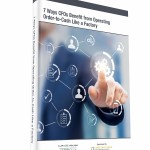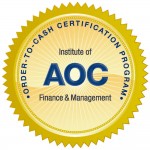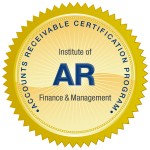
- Membership
- Certification
- Events
- Community
- About
- Help
There is a lot riding on an organization’s order-to-cash (O2C) cycle.
CFOs depend on visibility into the O2C process to develop strategies for:
But that’s easier said than done for most CFOs.
 Many finance organizations rely on manual, fragmented order-to-cash systems and processes with different levels of automation, no standardization, and running on different technology platforms. If factories operated in a fragmented manner like this, goods would never make it to the loading dock.
Many finance organizations rely on manual, fragmented order-to-cash systems and processes with different levels of automation, no standardization, and running on different technology platforms. If factories operated in a fragmented manner like this, goods would never make it to the loading dock.
It is no wonder that finance organizations are busy investing time and money in integrating their order-to-cash systems, standardizing order-to-cash processes, and improving access to critical data.
They are looking to operate order-to-cash like a factory: with high precision and no friction
IOFM’s latest white paper details the challenges with manual, fragmented O2C processes, describes an O2C factory and how it works, and lays out the 7 ways that CFOs benefit from an O2C factory.
If your dissatisfied with your O2C processes, maybe it’s time to start operating them like a factory.
Continuing education credits available:
 Receive 1 CEU toward IOFM AR and O2C certification renewals! The Accounts Receivable Certification Program is designed to establish standards for the profession and recognize accounts receivable professionals who, by possessing related work experience and passing a comprehensive exam, have met stringent requirements for mastering the accounts receivable body of knowledge.
Receive 1 CEU toward IOFM AR and O2C certification renewals! The Accounts Receivable Certification Program is designed to establish standards for the profession and recognize accounts receivable professionals who, by possessing related work experience and passing a comprehensive exam, have met stringent requirements for mastering the accounts receivable body of knowledge.
This white paper is provided free of charge and underwritten by a sponsor. Following your download, you may be contacted by the sponsor with information about their products and services.
Continuing Education Credits available:
Receive 1 CEU towards IOFM programs:

 Receive 1 CEU towards maintaining any AR and O2C related program through IOFM! These programs are designed to establish standards for the profession and recognize accounts payable and procure-to-pay professionals who, by possessing related work experience and passing a comprehensive exam, have met stringent requirements for mastering the financial operations body of knowledge.
Receive 1 CEU towards maintaining any AR and O2C related program through IOFM! These programs are designed to establish standards for the profession and recognize accounts payable and procure-to-pay professionals who, by possessing related work experience and passing a comprehensive exam, have met stringent requirements for mastering the financial operations body of knowledge.
What are you waiting for?